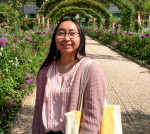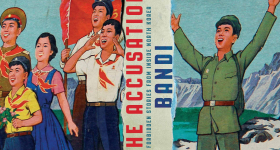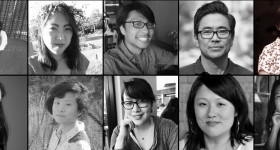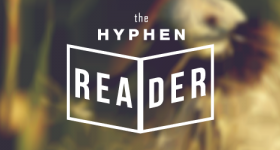The World I Leave You: Asian American Poets on Faith and Spirit is a poetry anthology recently published by Orison Books. Editors Leah Silvieus and Lee Herrick have curated over 100 poems by Asian American diasporic poets that offer a multifaceted exploration of faith. (Editor's Disclosure: Leah Silvieus is one of Hyphen's Books editors.) Silvieus and Herrick present these soul-searching works in six sections, including the divine within nature, ancestry, political resistance, and prayer and ritual.
This poetry collection invites the reader to consider an artist’s work in the context of cultural heritage and spiritual beliefs, whether it emerges from a collective or personal identity. In the section “Dearest Father, Forgive Me For I Have Seen: On Doubt And Questions Of Faith,” Filipino American poet Michelle Peñaloza and Korean American poet Hyejung Kook explore the inaccessibility of another’s spiritual pain and desire by engaging with an emblematic religious art piece in the Western canon: Gian Lorenzo Bernini’s marble Ecstasy of Saint Teresa. In “Vestige,” Peñaloza carves the aestheticized pain of the arrow that pierces the marble saint onto the scene of her mother “wailing the Rosary at my Lola’s funeral.” The comparison transforms the mother’s grief into a transcendental pain, a spiritual suffering as sacred as the saint. Yet the speaker, without faith of her own, can only envy her mother’s ecstasy and observe the beautiful pain as an outsider. Meanwhile, the two overlapping voices of Kook’s “Invention No. 9 in F Minor” resembles a poetic manifestation of “transverberation,” an act of piercing through, in the narration of Saint Teresa's experience. Both speakers grapple with faith in face of desire: the first voice questions, “how did you contain / yourself, find such joy / in the bridling of desire?” The second voice wholeheartedly requests, “If I thought it would fulfill / this want, grant me / the little birdling of my desire.” The inability to understand the other voice’s spiritual experience ends the poem in an irreconcilable “bridling”/”birdling” sense of desire.
The poets of The World I Leave You also contextualize God, morality and faith in its colonial history and the inherently politicized identities of Asian Americans. The poems of the section “We Were Brown and Immigrant: Spiritual Practice as a Form of Political Resistance” bear witness to xenophobic discrimination of Asian America. Pakistani American poet Faisal Mohyuddin vehemently responds to the anti-Islamic “monster”-ing of a Muslim woman on the Westminster bridge during the 2017 terrorist attack. The photograph of her on her phone during the horrific scene was condemned as heartless, the marker of a non-Christian. In one of many powerful declarations, the speaker of “In Defence of Monsters” both rebukes the racist West and reclaims the dignity of belonging to an Asian heritage: “Let them monster their invented heartache, / grafting it onto the living hurts that their own kind rubbled / into their lives, leaving them so broken their eyes had nowhere safe / to turn except onto our faces whose incandescent beauty / filled them with such massive libraries of shame they needed / again the native strength of our shoulders to carry / their brittle bodies. …” By the end of the poem, Mohyuddin has revealed the aggressors to be the real monsters of this narrative. The dehumanization of the “other” is a cruel attempt to ease their anxiety, carried out by their own “monstering” minds and hands.
The reader encounters prayer and ritual woven into the storyline of every one of these selected poems. Younger generations inherit spirituality from their elders, along with cultural tradition, omnipresent in relationships with grandparents, parents, native tongues, nature, history and trauma. In Su Hwang’s poem “Cancer,” The Lord’s Prayer fills the static air as placeholder words recited by the “Wisp of [her father’s] former self,” which only frustrates the speaker because of the lack of communication in their father-daughter relationship. Following his prayer, the father tells her intently: “I know you. You have a frontier spirit.” But these, still, are not the words that she wants to hear. While the father finds revelation in telling his daughter in the middle of the Lord’s Prayer — despite the poem saying “not a word passed between [them]” as they drove through “the blurred liturgy of autumn, spring” — the daughter is still learning to reconnect, to start a conversation. That is, she has yet to learn how to pray. In the case of ritual, the speaker of Amy Uyematsu’s poem “Pilgrimage to Jokhang Temple” considers the particular individual as a participant of history, culture and religion. The final section of the poem is a series of questions: “Is the ardor that burns within [the pilgrims] / stronger because of war, more fervent / because their Dalai Lama was forced to leave? / Or is this yearning born from something deeper, / their long history of suffering sustained by / a faith I may never understand, / a sacred practice unaffected by political winds— / ancient and enduring as Tibet.” The reader is called to contemplate whether the “pilgrim’s language” is translatable, and to what extent cultural history and national trauma might, in a perplexing way, grow one’s faith. Other poems deal with the tension between inherited traditions and one’s current religious practice (or lack thereof). For example, “Allegory For Family Members” by Vietnamese American poet Duy Doan explores the unsettling tension between doubt in one’s inherited religion and a childhood nostalgia for those inherited traditions. The speaker directs the poem’s central question, “Who will pray for me when you are gone?” to his grandmother in the context of childhood memories of Catholic sermons and lunar new year celebrations that he feels are sanctified by her presence:
the master of ceremonies with her microphone
a young child making hand
shadows over palm
leaves during a sermon /…/guilt, Catholic gifts
red and gold paper
packets wasted on games
The speaker’s later confession, “I killed the pope,” abruptly sends him adrift. Implicated in this sudden, violent act is the unanchoring of his spiritual self from an inherited Catholic identity, which consequently strains his relationship with his pious grandmother. He presses her with more questions as if to test whether he has lost her favor by rejecting the sacred figures and traditions of the Church: “Did my confession make us closer? /…/ When you told everyone I was your favorite, was this before or after I confessed?” Nevertheless, his experience of Catholicism retains a cultural familiarity, if not spiritual one.
The poems of The World I Leave You deal with the inheritance of religion and culture, grapple with the politicization of Asian American identities, and weave spiritual experiences into personal, familial and national memories. Silvieus and Herrick have compiled verses of questions posed by voices so honest, genuine, vulnerable, challenging. They have truly delivered these poems as “artifacts to be explored, contemplated and savored as gifts” in an anthology that puts faith and spirit in what I hope is an emerging and growing dialogue with the Asian American reader.










Comments